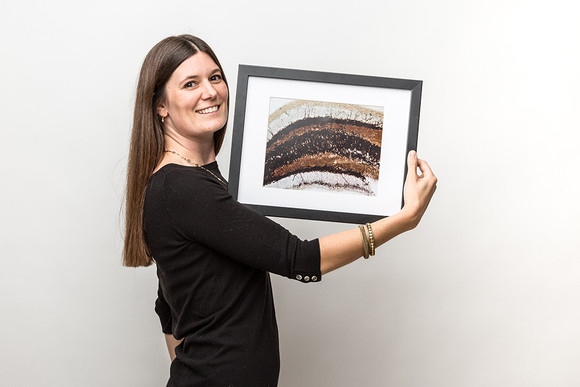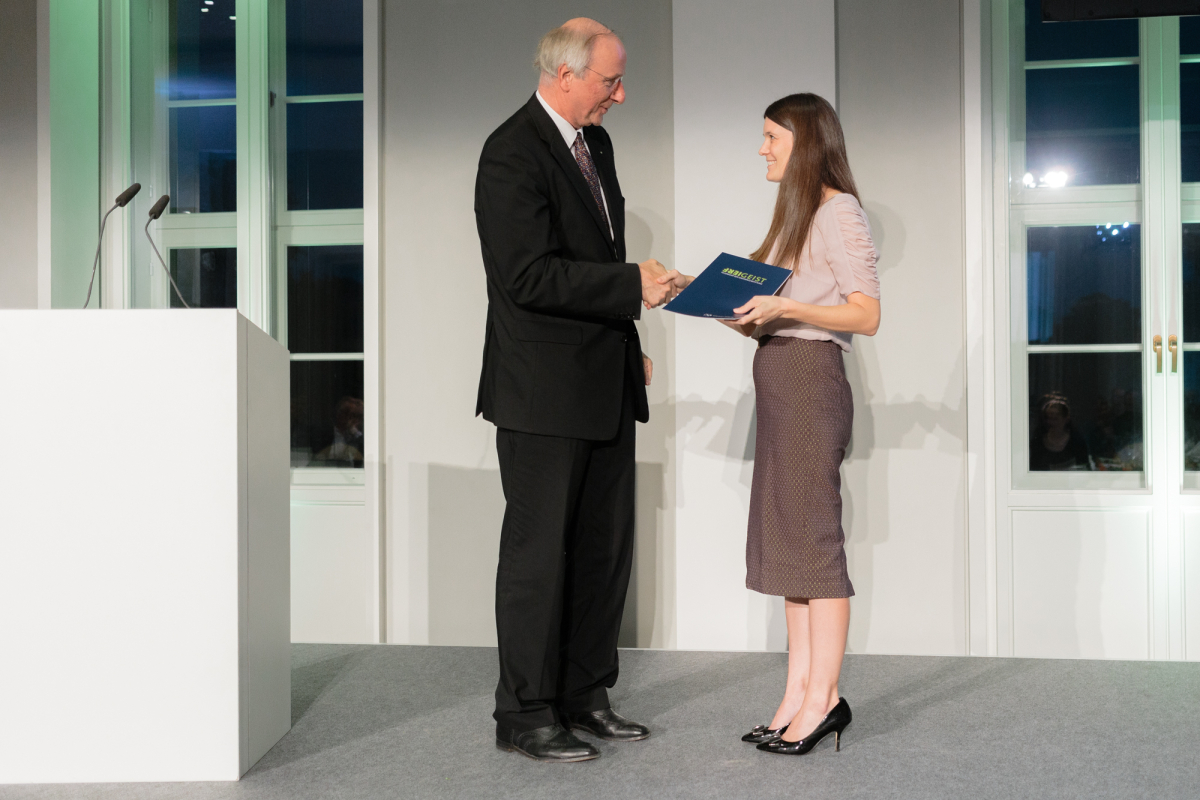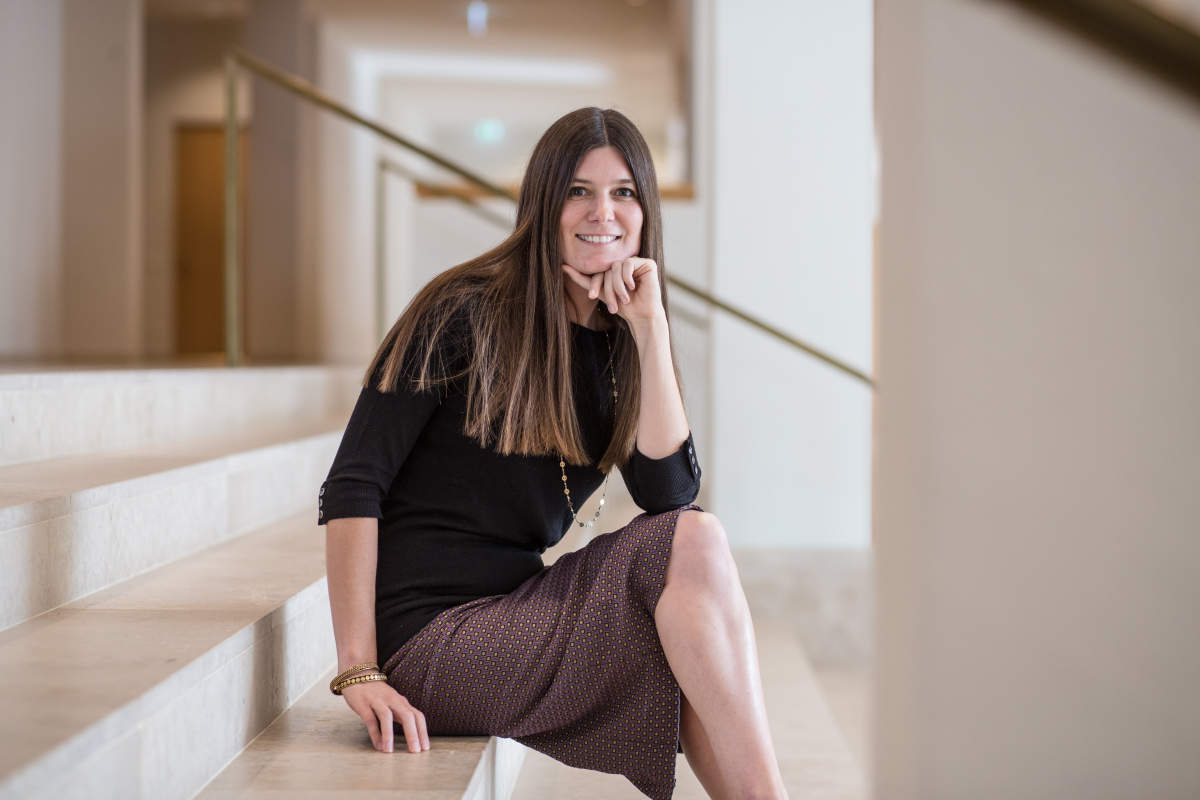Dem Gehirn beim Arbeiten zuschauen - Freigeist-Fellow Laura Ewell im Interview
Dr. Laura Ewell entwickelt als Freigeist-Fellow eine neue Technik, mit deren Hilfe einzelne Nervenzelltypen dem Verhalten zugeordnet werden könnten. Wir sprachen mit ihr über das Forschungsprojekt, das Fellowship-Programm und was sie als Wissenschaftlerin und Freigeist antreibt (in englischer Sprache).
Neural networks in the brain consist of many different cell types that are precisely interconnected to perform computations that are the foundation for behavior. But how do you connect the exact identity of the neurons with the behavior they are responsible for? There are still technical barriers to answering this question. Neurobiologist Dr. Laura Ewell, Freigeist-Fellow of the Volkswagen Foundation, is developing a new technique to identify cells with particular patterns of activity within an intact functioning network. Afterwards the scientist would be able to further examine the identified cells. This would for example help to find out more about the disease epilepsy.
Laura Ewell carries out her Freigeist-Project "Optical activity-dependent single neuron tagging in behaving animals: Linking single cell properties to behavior" at the University of Bonn, Institute of Experimental Epileptology and Cognition Research (http://eecr-bonn.de/ewell-group/). She was born in Michigan, USA and studied Science and French at the University of Wisconsin-Madison before she became a neuroscientist. She worked as a post doc at the University of California, San Diego, and was granted a Freigeist-Fellowship in 2016.
What were your first steps as a neuroscientist?
Laura Ewell: During my Ph.D. in neurophysiology, I was trying to understand how very small networks of neurons talk to each other. Basically, there are two kinds of neurons in our brains, the ones we call excitatory - they turn other neurons on. And the ones that are inhibitory, they turn other neurons off. I was interested in how signals go through networks comprising these two types of neurons. When you work at that level, you're very far away from what the brain actually does during behavior. So I became very curious about connecting these questions.
Did you change your research focus because of this curiosity?
Yes, for my post doc, I went on to study in vivo neuroscience, in which we record the activity from neurons while animals are awake and behaving. In this way we can connect the activity patterns within neural networks to specific behaviors. During most of my postdoc I was recording from the brains of animals that have epilepsy. One of my findings: There's actually a lot of heterogeneity –neurons have varying levels of impairment – in brains of animals with this disease. I wanted to find out which neurons are which.
Why is it important to know more about the neuronal cell type?
I think it's especially important in the case of disease: If we could understand the exact identity of the neurons that are sick, maybe we could develop therapies that target those. I started to think a lot about ways to label individual neurons that we're recording from in vivo. And that's what this project is about.

Freigeist-Fellow Dr. Laura Ewell. (Photo: Martin Bühler for Volkswagen Foundation)
Please give us more details on your project.
We want to develop a novel technique to label the neurons we are recording from – using a fluorescent protein called Campari. It is both calcium sensitive and light sensitive. The calcium sensitivity means that it changes when the neuron is active. But what is special about this protein: When the neuron is active and you shine it with light, it will go through what is called a photoconversion, and it will change to a different form that makes it glow. It's a coincidence detector - because it changes its fluorescence when there is the coincidence of activity, which the brain is generating, and a light stimulus, which the experimentalist is generating. And the best thing is, when it changes fluorescence, it will do that permanently.
In this way, you can mark the neurons you are recording from?
We can take advantage of this - if we are recording from neurons and they have this protein in them, we can design a closed-loop system. Whenever that neuron is active, we stimulate the light. And hopefully, what we would then do is label it permanently.
Your main interest is using this novel technique to work on epilepsy?
Yes, exactly. I work in temporal lobe epilepsy. One of the reasons I am really interested in this type is that the seizures are manifesting in the part of the brain that make memories. This part of the brain seems very susceptible to epilepsy. And I suggest this has got to do with the mechanisms that allow us to make memories, that they are especially susceptible to hyperexcitable activity. If it will be possible to connect brain function to cellular properties, this could be an important step for treating and curing diseases, such as epilepsy, which is rooted in cellular dysfunction.

Dr. Wilhelm Krull, Secretary General of Volkswagen Foundation, hands Dr. Laura Ewell her Freigeist certificate at the award ceremony in Herrenhausen Palace. (Photo: Sven Stolzenwald für VolkswagenStiftung)
How did you hear about the Freigeist Fellowships for the first time?
I met Heinz Beck at an epilepsy conference. We have very similar research interests, but we go at these problems with different techniques. He invited me to come and work here in Germany. He was the one who first told me about the Freigeist program - and now he is my supervisor at the University of Bonn.
How did the application process go for you? Was there anything that could have helped you with it?
No. For me it was very straightforward. I can say that it was incredibly fun. It's really different than any grant mechanism I've ever applied for in the United States. Usually, in the United States, you almost have to have the results finished to be awarded the grant. In this case, I was just allowed to dream and just think, "Well, what could I do? Let's just imagine that I could do all of these things. What could I answer?"
For me it was really helpful that I had Heinz's support because, especially when we got to the point where we were getting statements from the university, I think that would have been very difficult, coming from the outside.
What does the Freigeist Fellowship mean to you personally?
It is the ability to follow a dream - to be creative. I wasn't someone who really thought of myself as a creative scientist. And it pushed me in a way that I had never been pushed before, and that was kind of delightful. Upon further reflection, I think it also means being an intellectual. And I think that's rare in modern-day academics, to be given the chance to work independently and almost free from restrains. The Freigeist Fellowship also connects you with other researchers who think similarly and also love what they do. It is a special atmosphere.
So how was your start in the German university system?
Good. What was new to me: There are a lot of "toys" around as a scientist because there is a lot of money that goes toward equipment. And that's actually really nice because you can continually get the newest technology, which facilitates amazing science. Sometimes I feel like I am in a kind of "researcher candy store". Also, I really wish I spoke German, so I am learning, langsam!
Finally what about your research group?
I’ve recruited a team of young individuals from all over the world. I have a talented technician who is helping out in the lab and, being German, helping me navigate the University admin. We have two new PhD students, excited to learn, and I hosted an ERASMUS intern for the last few months. We’re just getting rolling – so check back in a few years!
Mehr Informationen
Der nächste Stichtag für eine Bewerbung auf ein Freigeist-Fellowship ist der 11. Oktober 2018. Hier finden Sie alle Informationen zur Förderinitiative Freigeist-Fellowships. Die Referenten der Förderinitiative geben in einem zweiteiligen Interview Einblick in das Fellowship-Programm und den Antrags- und Begutachtungsprozess: "Freigeist-Fellows agieren nicht im Forschungs-Mainstream" – Die Referenten der Initiative im Interview
Thema Tierversuche – Stellungnahme
Als fördernde Stiftung führt die VolkswagenStiftung selbst keine wissenschaftlichen Studien und Versuche durch. Sie beauftragt diese auch nicht. Im Rahmen ihres Förderangebots unterstützt sie wissenschaftliche Forschungsprojekte in allen Disziplinen, vor allem Beiträge zur Grundlagenforschung. In einem sehr kleinen Bereich der Förderung kann dies auch Tierversuche beinhalten, etwa in biomedizinischen (z. B. neurowissenschaftlichen) Vorhaben. Eine Stellungnahme der Stiftung zum Thema Tierversuche ist hier nachzulesen.

Dr. Laura Ewell at Herrenhausen Palace in Hanover. (Martin Bühler for Volkswagen Foundation)
